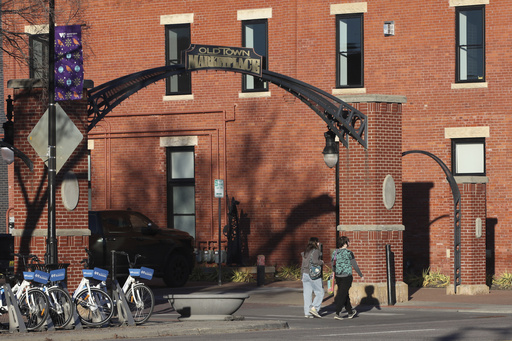
WICHITA, Kan. — On a poignant Wednesday night, American Eagle Flight 5342 departed from Wichita, a city synonymous with a rich aviation legacy, hot on the heels of a significant event. The U.S. Figure Skating Championships had recently taken place in the city, showcasing aspiring Olympians and marking a triumph for community planners who envisioned the 15,000-seat arena opened in 2010 as a venue for such major events. This achievement seemed to put Wichita firmly in the spotlight against the backdrop of America’s heartland. However, tragedy soon overshadowed the moment, as news broke that the flight had not completed its journey.
Mayor Lily Wu expressed deep sorrow over the situation, stating, “We were so proud to see these high-level athletes, their families, their friends, fans, coming to our community and sharing their skills and talents so that the whole world could see. To end it with this type of tragedy just truly breaks my heart.” The incident in question involved a midair collision between the aircraft and an Army helicopter in Washington, D.C. This catastrophic event has left the community in mourning, as it marks the worst aviation disaster in the U.S. in over a generation, resulting in the deaths of 67 individuals, including young skaters who were in Wichita for a national development camp. Tragically, there were no survivors from the crash.
Wichita, with its population nearing 400,000, has longstanding ties to America’s aviation sector and serves as a crucial hub for oil companies, engineers, and drillers connected to the industry’s cyclic nature. While the exact number of victims from Wichita remains uncertain, local authorities have yet to release a comprehensive passenger list, which is expected to include a range of individuals, from hunting companions to professionals on business trips and a college student returning from her grandfather’s memorial.
In the immediate aftermath of the tragedy, community and faith leaders organized a prayer vigil, drawing hundreds of attendees who united to pray for the grieving families. Rabbi Shmulik Greenberg of Chabad remarked, “This unity cannot just stay in sadness. It has to elicit something greater, something brighter, something that can shine forth.”
Historically, Wichita began as a trading post following the American Civil War before briefly thriving as a cattle town. The city’s significant growth occurred in the 1940s and 1950s, during which military and civilian aircraft production flourished. Signs at the Dwight D. Eisenhower National Airport, named after the president hailing from nearby Abilene, herald Wichita as the “Air Capital of the World.” Local pioneers such as Clyde Cessna and Walter and Olive Ann Beech helped advance the aviation industry, and during World War II, Boeing produced over 1,700 bombers in Wichita. As reported by the Kansas Aviation Museum curator Logan Daugherty, tens of thousands of residents are employed in the aviation sector, which comprises major manufacturers like Spirit AeroSystems and a network of over 350 suppliers identified by the Greater Wichita Partnership.
The city’s entrepreneurial spirit has resulted in noteworthy establishments as well, like the first White Castle restaurant that opened its doors in 1921, paving the way for fast-food chains. Additionally, Wichita State University alumni founded the first Pizza Hut in 1958. Koch Industries, a colossal entity in energy, agriculture, and manufacturing, is headquartered in the city, employing more than 121,000 individuals. Recently, the community celebrated the inaugural anniversary of the American Airlines commercial flight route from Wichita to Washington, D.C.
Bombardier, the manufacturer of the downed passenger plane, has its U.S. headquarters in Wichita, and local official Jim Howell indicated the aircraft was certified in the city. Howell, who has significant experience in flight testing, noted that many employees still contribute to testing and maintaining similar aircraft in Wichita.
The city’s population has significantly diversified since doubling between 1940 and 1960, with its public school system—Kansas’s largest—encompassing families from over 100 nations and exposing over 11% of the state’s students to more than 110 languages beyond English. Politically, Wichita presents a complex landscape. While it has favored Donald Trump in previous elections, Democratic Governor Laura Kelly has also experienced victories in the area.
Wichita has endured its share of aviation tragedies in the past, notably in 1970 when a plane carrying Wichita State University’s football team crashed in Colorado, claiming 31 of the 37 onboard. Following the recent aviation disaster in Washington, local charitable organization Wichita Community Foundation initiated a fund to assist families affected by covering funeral costs and offering mental health services. Foundation President Shelly Prichard noted that they began receiving inquiries about how to help immediately after the incident occurred.
Community member Kristin Anneler, who attended the vigil, expressed admiration for the diverse gathering of individuals from different backgrounds and perspectives coming together to honor the victims. She remarked, “It’s just a tiny little bite — right? Of the cross section of humanity that we often forget about because we run in our own circles and we think our own thoughts.”

